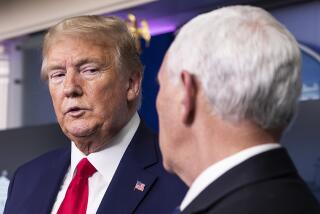Clark Defends His Testimony and Position on the War in Iraq
MANCHESTER, N.H. — Republican National Committee Chairman Ed Gillespie on Thursday attacked Democratic presidential hopeful Wesley K. Clark in Clark’s hometown of Little Rock, Ark., saying testimony Clark gave to a Congressional committee in 2002 contradicts his current position opposing the war in Iraq.
Clark, clearly fired up about what he viewed as a twisting of his comments, said his testimony was consistent with his current stand against the war.
The RNC released a transcript of the retired four-star general testifying before the House Armed Services Committee in 2002. In his testimony, Clark called former Iraqi president Saddam Hussein a threat and said action against his regime could not be postponed indefinitely.
“The use of force must remain a U.S. option under active consideration,” Clark said at the time, adding that the United States had the right to act preemptively and that he believed Hussein possessed weapons of mass destruction.
Upon arriving in Manchester from a campaign swing through South Carolina on Thursday, Clark said the Republican attacks were evidence that his campaign was gaining momentum.
“It looks like they’ve finally figured out that I’m George Bush’s greatest threat,” he said, and blamed White House political advisor Karl Rove for the attack.
A tracking poll this week showed Clark pulling within 5 percentage points of frontrunner Howard Dean in New Hampshire, where Dean once held a 25-point lead over his nearest rival.
Having forgone the Jan. 19 Iowa caucuses, Clark has campaigned in New Hampshire more and more on his opposition to the war in Iraq, but also has been forced to address several earlier comments in which he seemed to support action against Hussein.
On Thursday, he said his comments to the committee were entirely consistent with recent statements in which he said President Bush rushed to war without solid evidence that Iraq had weapons of mass destruction and before exhausting possible diplomatic resolutions.
“What I was saying then is what I’m saying today,” Clark said. “That Saddam Hussein was not an imminent threat.... Was he troublesome? Sure. Was he a threat eventually? Sure. Was the clock ticking in the two-year, five-year, 10-year time period? Sure. Did we have to do this? No.”
Shortly after entering the race in mid-September, Clark said he “probably” would have supported a congressional resolution supporting the war.
Having skipped the Iowa caucuses, Clark had, until recent days, been largely unhindered by attacks while campaigning in New Hampshire, which holds the nation’s first primary on Jan. 27. As he has risen in the polls, however, he has come under more scrutiny.
Sen. Joe Lieberman of Connecticut, who also is skipping Iowa and is in the single digits in polls in New Hampshire, has become one of Clark’s most ardent critics. “It is no longer credible for Wesley Clark to assert that he has always had only one position on the war -- being against it,” Lieberman said Thursday. “His own testimony before Congress shows otherwise.”
More to Read
Get the L.A. Times Politics newsletter
Deeply reported insights into legislation, politics and policy from Sacramento, Washington and beyond. In your inbox three times per week.
You may occasionally receive promotional content from the Los Angeles Times.









